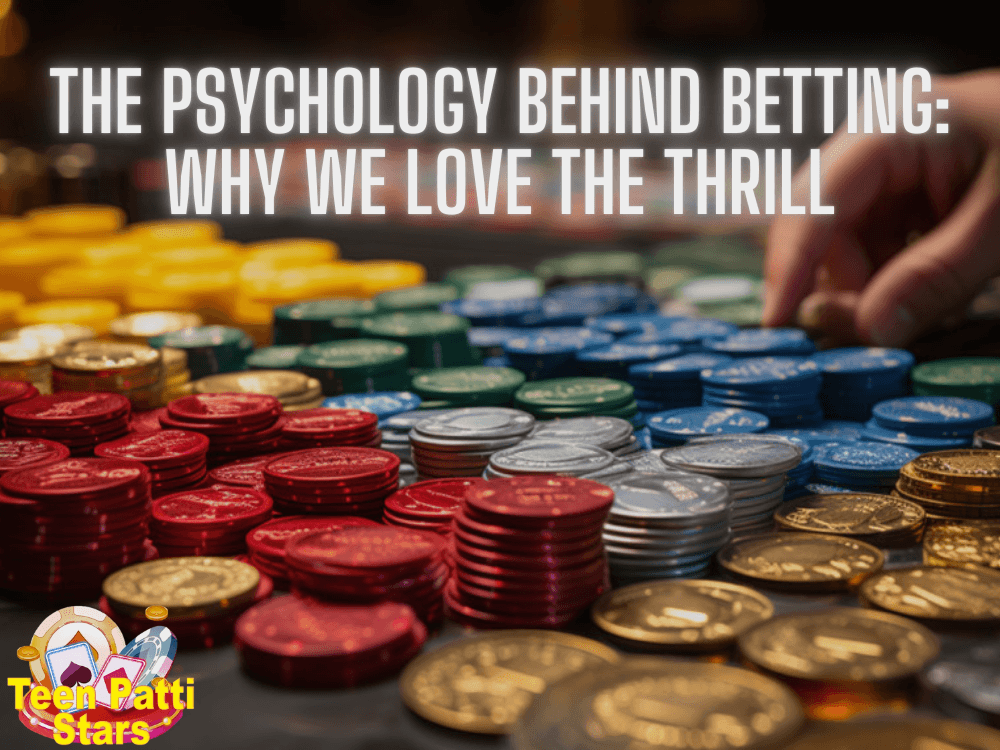The Psychology Behind Betting: Why We Love the Thrill
Betting has been part of human culture for thousands of years, evolving from simple wagers in ancient societies to the complex, global industry we see today. From sports events to casino games and even online platforms, betting offers an exciting, adrenaline-pumping experience that attracts millions of people worldwide. But what exactly drives this widespread love for betting? The answer lies not only in the chance to win money but also in the intricate psychological mechanisms that make gambling so appealing. Understanding the psychology behind betting can shed light on why people are drawn to the thrill, sometimes even when the odds are against them.
The Attraction to Risk and Reward
At the heart of every bet is the concept of risk versus reward. Human beings are naturally wired to seek rewards, and when there is a degree of uncertainty or risk involved, the potential reward becomes even more enticing. This is rooted in our evolutionary biology, where taking risks was often necessary for survival. Early humans who were willing to take risks to hunt or gather food had a better chance of thriving. Over time, this predisposition toward risk and reward has carried over into modern activities like betting.

In the case of gambling, the possibility of winning big taps into the brain’s reward system. Every time you place a bet, especially when there’s a chance of winning a significant amount, your brain releases dopamine, a neurotransmitter responsible for pleasure and motivation. This dopamine release creates a feeling of excitement and anticipation, making the experience of betting thrilling and satisfying.
The Allure of Uncertainty
Uncertainty plays a crucial role in why betting is so thrilling. The human brain is fascinated by uncertainty, as it triggers curiosity and excitement. When we don’t know the outcome of an event, especially one we are personally invested in, the anticipation of what might happen can be exhilarating.
This uncertainty is what makes betting so engaging. If the outcome were guaranteed, much of the excitement would disappear. The suspense of waiting to see whether a team wins, a card falls in your favor, or the roulette wheel lands on your number heightens the emotional experience. This tension creates a psychological state where the brain is continually seeking resolution, and when it comes in the form of a win, the emotional high can be incredibly intense.
The Role of Near Misses
One of the fascinating psychological aspects of betting is the phenomenon of “near misses.” A near miss occurs when a gambler comes close to winning but ultimately falls short. Studies have shown that near misses can be just as motivating, if not more so, than actual wins. This is because near misses create the illusion that victory is just within reach, encouraging the player to keep trying, even though the odds may not be in their favor.
The brain processes near misses similarly to actual wins, producing a dopamine response that keeps the player engaged. This is why you often hear phrases like “I was so close!” after a near miss. The belief that the next bet could be the winning one drives people to continue gambling, feeding into the cycle of betting.
The Gambler’s Fallacy
Another common psychological mechanism at play in betting is the gambler’s fallacy. This cognitive bias leads people to believe that past events can influence future outcomes, even when those outcomes are entirely independent. For example, a gambler who has lost several bets in a row might believe that they are “due” for a win, despite the fact that each bet is statistically independent of the others.
This fallacy can keep people betting longer than they should because they start to believe that their luck is bound to change. The longer the losing streak, the stronger the conviction that a win is imminent. This belief in the inevitability of a win often leads to higher bets and riskier behavior, increasing the potential for significant losses.
Social and Emotional Factors
In addition to the cognitive aspects of betting, there are also strong social and emotional components that contribute to its appeal. For many, gambling is a social activity. Whether it’s placing bets on a sports match with friends, attending a casino with a group, or participating in an online poker tournament, the social interaction enhances the overall experience.
The camaraderie of betting with others adds another layer of excitement and can create a sense of belonging. In some cases, the social environment of betting can lead to peer pressure, where individuals feel compelled to bet because everyone else is doing it. This social dynamic can amplify the thrill of gambling, making it a more immersive and engaging activity.
Additionally, the emotional highs and lows of betting create a rollercoaster of feelings that can be addictive. Winning generates intense feelings of joy and accomplishment, while losing can lead to frustration and a desire for redemption. These emotional swings can make betting feel more personal and meaningful, even when the outcomes are largely based on chance.
The Impact of Winning
The emotional and psychological impact of winning cannot be understated. When a gambler wins, the sense of achievement and euphoria can be incredibly powerful. Winning not only validates the bet but also reinforces the belief that skill or intuition played a role in the outcome, even when the result was purely random.
This reinforcement encourages future betting because it creates a feedback loop. Each win boosts confidence, making the gambler feel more in control of the situation, even if the outcome was largely due to chance. The thrill of winning, especially in high-stakes situations, can lead to riskier bets as gamblers seek to replicate the feeling of success.

The Dark Side: Betting Addiction
While betting can be a fun and exciting activity for many, it also has a darker side. The same psychological mechanisms that make betting thrilling can also contribute to gambling addiction. The brain’s reward system, which is activated during betting, can become overstimulated, leading to compulsive behavior.
Gambling addiction, also known as problem gambling, occurs when the urge to gamble becomes uncontrollable, despite the negative consequences. This addiction is often fueled by the desire to chase losses, recapture the feeling of winning, or simply experience the thrill of betting. Over time, the pursuit of these highs can lead to significant financial and emotional problems.
For individuals struggling with betting addiction, the thrill of gambling can quickly turn into a destructive cycle. The brain becomes conditioned to seek the dopamine rush that comes from betting, and as tolerance builds, gamblers may need to place riskier and higher bets to achieve the same level of excitement.
Conclusion
The psychology behind gambling is a complex interplay of cognitive biases, emotional responses, and social influences. From the excitement of risk and reward to the allure of uncertainty and near misses, betting taps into fundamental aspects of human nature. The thrill of betting is not just about winning money; it’s about the experience of uncertainty, the emotional highs and lows, and the social connections that come with it.
However, while betting can be enjoyable and thrilling, it’s essential to recognize the potential for addiction and the dangers of irresponsible gambling. Understanding the psychological mechanisms at play can help individuals approach betting with awareness and caution, ensuring that it remains a fun and controlled activity rather than a harmful obsession.
Discover feature-rich Teen Patti Game Apps with engaging gameplay options. Click here to download the best one!


